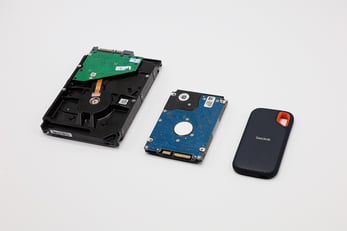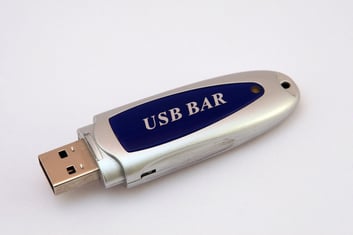As mentioned in Best Practices for Data Backup Solutions, backing up sensitive data is crucial to protect it from unforeseen threats and events. It also helps meet cybersecurity compliance and fulfill a robust disaster recovery plan, as having multiple copies of your important data minimizes the risk of data loss.
When it comes to data backup solutions, businesses have various options to choose from: external hard drives, removable storage devices, cloud storage, physical off-site storage and network attached storage (NAS). Any type of backup is better than no backup, and physically separating your backup from your device via air gapping adds another layer of protection.
However, each option has risks and benefits, so let’s see which is best for your company.
Read: The 6 Types of Disaster Recovery Plan Solutions
External Hard Drives
External hard drives are separate devices wirelessly connected or plugged into another device via FireWire or USB. Many come with backup software installed to automatically back up data for you, and you can password-protect them for extra safety.
PROS:
- They’re simple and easy to use
- They’re small and portable
- There’s no monthly service charge
- They’re affordable
- They have a large storage space
- They have fast transfer times
- They don’t need to be connected to the internet to get the data
- The data is isolated once you unplug the hard drive
- You can access the data anywhere (as long as you have the hard drive with you)
CONS:
- They can be physically lost, stolen, damaged or corrupted
- They will eventually fail or become obsolete
- They must be connected to do backups or updates
- If you run out of space, you have to buy numerous hard drives, which can be expensive
Removable Storage Devices
Like external hard drives, removable storage devices exist to transfer data between devices. Removable storage devices include a range of devices: solid-state devices (solid-state drives, flash drives, USBs, thumb drives, pen drives, jump drives, SD and microSD cards, memory sticks), optical storage media (CDs, DVDs, Blu-Ray discs) and tapes. Depending on the specific device, you can password-protect or encrypt the data for further protection against potential breaches and cyber attacks.
PROS:
- They’re simple and easy to use
- They’re small and portable
- There’s no monthly service charge
- They’re affordable
- They don’t need to be connected to the internet to get the data
- The data is isolated once you unplug the device
- You can access the data anywhere (as long as you have the device with you)
CONS:
- They can be physically lost, stolen, damaged or corrupted
- They will eventually fail or become obsolete
- They must be connected to do backups or updates
- They have limited storage space
- They have slow transfer speeds
- With so many different types, it can be difficult to use them across systems
Cloud Storage
Cloud storage, AKA online backup or remote backup, is when you back up data to a remote online server so you can access the data anywhere, anytime, on any device, as long as you have internet connection. A third party usually owns it and offers encryption, redundancy, and automated backups. Examples of cloud storage include Drive, iCloud, Dropbox, iDrive and OneDrive.
PROS:
- It’s easy to backup, maintain and recover data
- It’s affordable
- It’s good for scalability as your company grows or shrinks
- It’s safe from physical attacks or damage
- It doesn’t need physical equipment or maintenance
- It has lots of storage space
- It offers higher security levels
- You can access the data on any device with internet connection
- You can collaborate and share data with multiple users
CONS:
- You are relying on a third party to manage and protect your data
- It must be connected to the internet to get the data
- It can be expensive with a monthly fee
- It has slow transfer speeds
Read: The Best Practices Against Cyber Attacks
Physical Off-Site Storage
Physical buildings at least 100 miles from your main workspace are great ways to protect your data. They’re essential parts of the 3-2-1 rule, which states you should have three copies of data on two different media types and another copy off-site.
PROS:
- It can ensure business continuity
- It provides direct physical access to the data
CONS:
- It’s expensive to build and maintain the storage site and equipment
- It can be damaged during a natural disaster
- It can take a while to restore data
Network Attached Storage (NAS) Device
NAS is a file-level computer storage server connected to a local area network (LAN). This secure central location provides access and extended storage to multiple devices. NAS usually comes with cloud services so you can remotely access the data and automate backups.
PROS:
- It stores a large amount of data
- It makes it easy to collaborate
- It provides fast access to the data
- It has high transfer speeds
- It’s reliable
- It’s easy to manage
CONS:
- It can be affected by natural disasters
- It’s expensive
- It requires technical expertise to set up and manage
- It uses a lot of bandwidth
What About a Hybrid Approach?
While some companies might choose only one of these options, that’s usually a bad idea, as you want to have multiple copies of your data across different devices (remember the 3-2-1 rule?).
A hybrid combination of these backup solutions is the best option for most businesses. If your internet goes down, a cloud backup won’t help. A physical storage device could be damaged if the building that houses it gets damaged. However, if you combine multiple devices, you always have a second – or third, if not fourth – option.
Thriveon and Protecting Your Data
AtThriveon, we understand the importance of business continuity efficiency and protecting your data. That’s why we offer services for strategic managed IT needs, meeting cybersecurity compliance and implementing professional IT project services.
Schedule an initial consultation with our team today.
